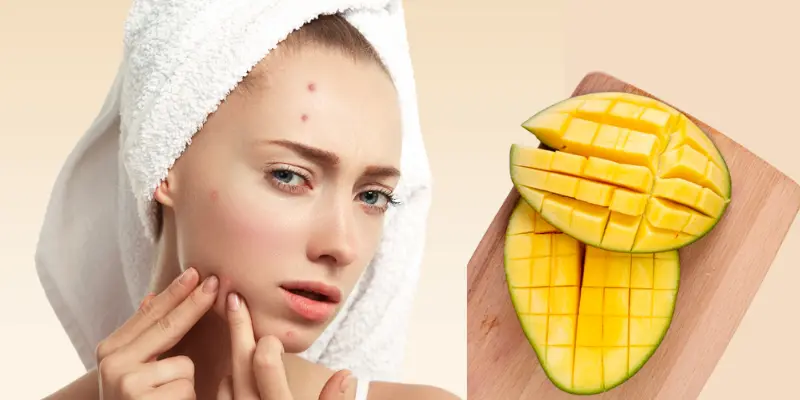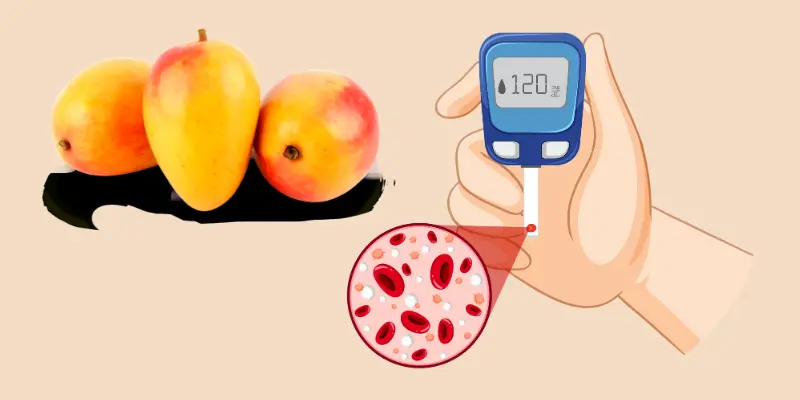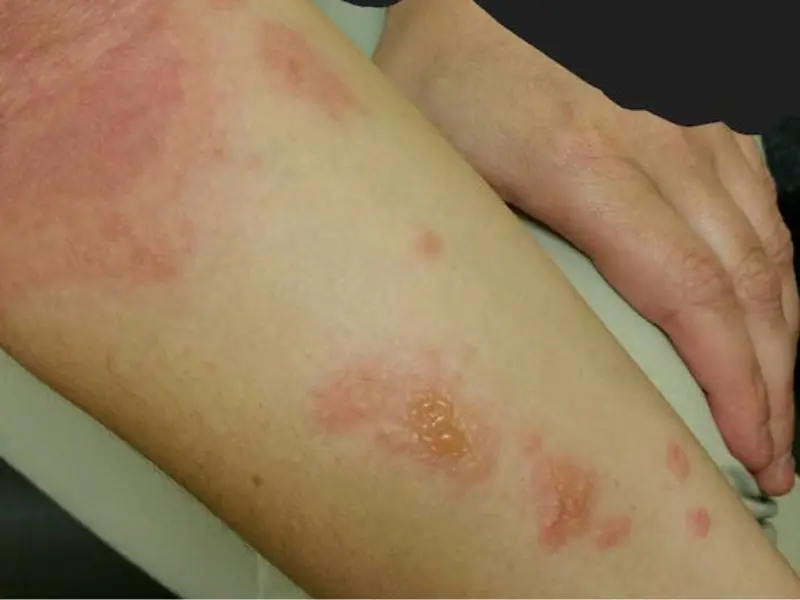Can Eating Mangoes Cause Acne?
Published: 23 Mar 2025
You have probably heard people saying, “Avoid mangoes if you have acne!” But aren’t the mangoes full of skin-loving vitamins? If they are supposed to be good for your skin, then how can they also cause breakouts?
The answer is not as simple as yes or no. Let’s see the truth about mangoes and their impact on acne.
1- What Really Causes Acne? (Simple Breakdown)
Acne is the combination of excess oil, dead skin cells, and clogged pores because of bacteria. These lead to inflammation and breakouts.
But there are many other factors too, contributing to acne. These are hormones, genetics, lifestyle and diet.

2- Can Eating Mangoes Cause Acne?
Many people also relate acne to other foods, such as almonds milk, bananas, spicy meals, rice, eggs, dairy, junk food or even peanut butter.
You will find many people blaming mangoes for causing acne, but is there any truth to this? The answer is not straightforward. That’s true, mangoes contain natural sugars and certain compounds.
These natural sugars and compounds might trigger breakouts in some people. But at the same time, mangoes provide you with skin-friendly nutrients like vitamin C and antioxidants.
Here’s how mangoes might cause acne:
- High Glycemic Index (GI) – A study highlighted that certain high-glycemic fruits, including mangoes, may contribute to acne. Mangoes contain a high sugar content, which can spike your blood sugar levels and lead to an increase in your insulin production, triggering oil production and potential breakouts. (1)

- Allergic Reactions – Some people experience skin irritation or rashes (mango face rash) due to mango sensitivity, which could worsen acne-like symptoms. (2)
That said, not everyone will break out from eating mangoes. If you notice acne flare-ups after consuming them, moderation might be the key. Let’s explore whether mangoes can be good for your skin as well.
Worried about mango skin irritation? Keep reading
3- Mango Skin and Acne: Should You Avoid It?
- Yes, eating mango skin may not be ideal for you if your skin is acne-prone. The skin of mangoes contains urushiol, a plant compound that can trigger skin irritation, redness, and allergic reactions in some people.
- While this doesn’t directly cause acne, it can lead to inflammation, which may worsen breakouts. (2)

- Additionally, mango skin may have pesticide residues if you don’t wash it properly. These chemicals can irritate your skin and potentially contribute to acne flare-ups if you have sensitive skin.
If you have acne-prone or sensitive skin, it’s best to peel the mango before eating to reduce the risk of irritation and inflammation.
4- 6 Easy Tips to Enjoy Mangoes Without Worsening Acne
If you love mangoes but worry about breakouts, don’t worry! You can still enjoy them without triggering acne by following these simple tips:

4.1 Eat in Moderation
- Mangoes have natural sugars that can spike blood sugar levels, potentially increasing sebum production and acne risk. So, eat mangoes in moderation.
Stick to half a mango per serving and balance it with fibre-rich foods to reduce sugar spikes.
4.2 Avoid Eating Mangoes with Other High-Sugar Foods
- Combining mangoes with sugary foods can increase inflammation, worsening acne.
Eat mangoes as a standalone snack or pair them with nuts, yoghurt, or seeds for better blood sugar control.
4.3 Wash Mangoes Properly Before Eating
- Pesticides or residues on the skin can irritate and may contribute to acne flare-ups.
Rinse mangoes under running water and soak them for 15-20 minutes before peeling.
4.4 Choose Ripe Mangoes Over Unripe Ones
- Unripe mangoes contain higher acidity, which may trigger inflammation in some individuals.
Pick fully ripe mangoes for a gentler effect on your skin.
4.5 Hydrate Well to Balance Internal Heat
- Mangoes are considered a heat-producing fruit, which may contribute to acne in some people.
Drink plenty of water and consume cooling foods like cucumber, yogurt, or mint to balance body heat.
4.6 Listen to Your Skin
- Everyone’s skin reacts differently to food. If mangoes trigger breakouts, reducing intake or eliminating them might be necessary.
Keep a food diary to track if mangoes impact your skin health.
5- Mangoes for Skin: Benefits vs. Breakouts
Mangoes can be both good and bad for the skin, depending on how your body reacts to them.
| 5.1 Why Mangoes Are Good for the Skin |
|---|
|

5.2 So, Should You Eat Mangoes for Healthy Skin?
If your skin tolerates mangoes well, they can be a great addition to your diet for a natural glow. However, if you notice breakouts or irritation after eating mangoes, consider reducing your intake or avoiding the skin.
Still wondering if your favourite foods are messing with your skin? Dive deeper with our latest skin-friendly diet tips, your future clear skin will thank you!
6- Final Thoughts: Can Eating Mangoes Cause Acne?
So guys, in this article, we’ve covered “Can Eating Mangoes Cause Acne?” in detail. The key takeaway? Mangoes won’t automatically cause breakouts, but if you’re prone to acne, it’s smart to watch your sugar intake and track how your skin responds.
My advice? Listen to your body, enjoy mangoes in moderation, and focus on a well-rounded diet. Have any skincare tips or experiences to share?
Found this helpful? Share it with your friends
7- FAQs
Mangoes don’t directly cause pimples, but their high sugar content can trigger breakouts in acne-prone skin. If you notice flare-ups after eating mangoes, try reducing your intake. Everyone’s skin reacts differently!
Mangoes themselves aren’t the cause of acne, but eating too many sugary foods can worsen breakouts. If your skin is sensitive, monitor how it reacts. Balance is key!
Yes! Mangoes are rich in vitamin A, vitamin C, and antioxidants that promote healthy skin. But eating too much can lead to excess oil production, which might not be great for acne-prone skin.
Mangoes contain vitamin A, which supports skin health and may help reduce inflammation. However, their high sugar content can spike insulin levels, possibly leading to breakouts. It’s all about moderation!
Not necessarily! If mangoes don’t trigger breakouts for you, there’s no reason to avoid them completely. Just eat in moderation and pair them with a balanced diet.
Mangoes contain natural sugars, which can increase oil production in some people. If you have oily or acne-prone skin, limit your intake and see if it makes a difference. Hydration and a good skincare routine help too!
Some people may develop a mango face rash due to an allergy or skin sensitivity to mango sap. If you experience redness or irritation after eating or touching mangoes, wash your skin immediately. If the rash persists, see a dermatologist!
Mango skin contains beneficial nutrients, but it can also trap pesticides and irritants, which may cause skin reactions. If you have sensitive or acne-prone skin, it’s best to peel mangoes before eating. Washing them thoroughly can also help!
Stick to small portions, eat them with fibre-rich foods, and drink plenty of water to balance sugar spikes. Avoid eating mangoes late at night when digestion slows. Pay attention to how your skin reacts and adjust accordingly!
8- Sources
At MedicaWire, all medically sensitive content is reviewed by licensed healthcare professionals. Our team ensures that the information you read is accurate, up-to-date, and based on trusted medical sources.
Learn how we maintain high standards by reading our Editorial Policy.
📚 Sources
- Diet and Acne: A Review of the Evidence – Journal of Clinical and Aesthetic Dermatology
🔗 https://www.ncbi.nlm.nih.gov/pmc/articles/PMC2836431/ - The Role of High Glycemic Foods in Acne Development – American Academy of Dermatology
🔗 https://www.aad.org/public/diseases/acne/causes/sugar - Vitamin A and Skin Health – National Institutes of Health (NIH)
🔗 https://ods.od.nih.gov/factsheets/VitaminA-HealthProfessional/ - Mango Allergy & Skin Sensitivity – American College of Allergy, Asthma & Immunology
🔗 https://acaai.org/allergies/types/food-allergies/types-food-allergy/mango-allergy/ - Glycemic Index of Fruits and Its Impact on Acne – Harvard T.H. Chan School of Public Health
🔗 https://www.hsph.harvard.edu/nutritionsource/carbohydrates/carbohydrates-and-blood-sugar/ - Impact of Dairy and Sugar on Acne – Journal of the American Academy of Dermatology
🔗 https://www.sciencedirect.com/science/article/pii/S0190962220312394 - Can Fruits Trigger Acne? – PubMed Central
🔗 https://www.ncbi.nlm.nih.gov/pmc/articles/PMC6365142/
ℹ️ Our Promise
MedicaWire follows strict sourcing guidelines and only references peer-reviewed studies, academic institutions, and reputable medical associations. We update content regularly to reflect new health information.

- Be Respectful
- Stay Relevant
- Stay Positive
- True Feedback
- Encourage Discussion
- Avoid Spamming
- No Fake News
- Don't Copy-Paste
- No Personal Attacks



- Be Respectful
- Stay Relevant
- Stay Positive
- True Feedback
- Encourage Discussion
- Avoid Spamming
- No Fake News
- Don't Copy-Paste
- No Personal Attacks




